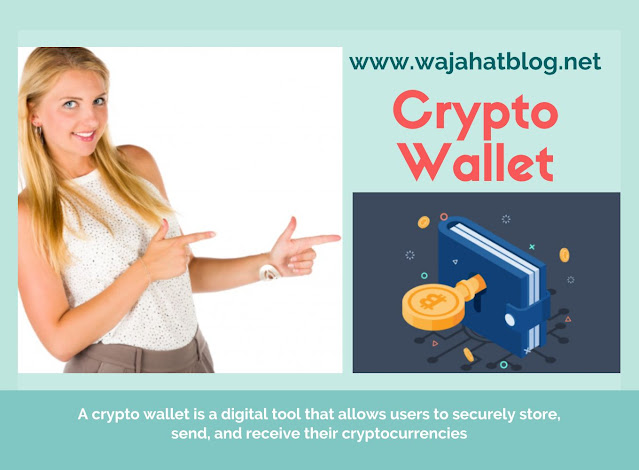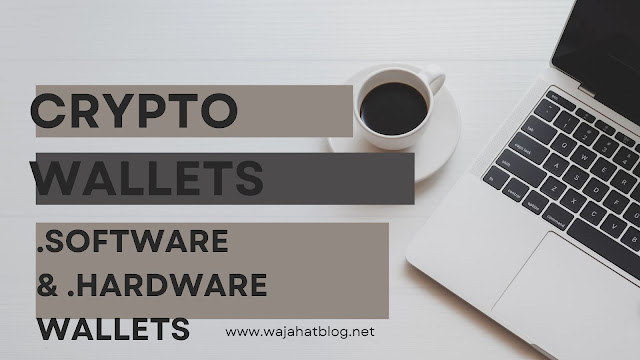Why a Reliable Crypto
Wallet is Your Ticket to Financial Freedom (wajahatblog.net)
Introduction
The rise of
cryptocurrencies has revolutionized the financial landscape, offering
individuals a decentralized and secure alternative to traditional currencies.
However, with this newfound freedom comes the essential need for a reliable
crypto wallet. In this article, we will delve into the world of cryptocurrency
wallets, exploring their importance and the crucial role they play in
safeguarding your digital assets.
Understanding
Cryptocurrency Wallets
What is a crypto wallet?
A crypto wallet is a
digital tool that allows users to securely store, send, and receive their
cryptocurrencies. It functions much like a traditional wallet, but instead of
physical cash or cards, it holds the user's private and public keys.
Different types of
crypto wallets
There are various types
of crypto wallets available, each with its own unique features and level of
security. The most common types include software wallets, hardware wallets, and
paper wallets.
The role of public and
private keys
Public and private keys
are integral components of a crypto wallet. The public key serves as the
wallet's address, enabling others to send funds to the user. On the other hand,
the private key acts as the access code, allowing the user to sign transactions
and gain control over their funds.
Security: The Crucial
Aspect of a Crypto Wallet
Importance of securing
your cryptocurrency assets
Given the digital nature
of cryptocurrencies, security becomes paramount. Protecting your assets from
hackers, scams, and other forms of theft is crucial for maintaining financial
freedom. A reliable crypto wallet acts as a secure vault for your digital
fortune.
Common security risks in
the crypto space
The crypto space presents
unique security challenges. From phishing attacks and malware to exchange hacks
and social engineering, users must be aware of potential risks. Unscrupulous
individuals are constantly attempting to exploit security vulnerabilities,
emphasizing the significance of a trustworthy wallet.
How a reliable wallet
protects your investments
A reliable crypto wallet
employs advanced encryption techniques and robust security protocols to
safeguard your investments. It utilizes state-of-the-art technologies, such as
multi-signature authentication and cold storage solutions, to provide an
unparalleled level of protection against unauthorized access.
Types of Crypto Wallets
Software Wallets
Definition and features:
Software wallets are digital applications installed on desktop or mobile
devices, providing convenient access to cryptocurrencies. They offer a
user-friendly interface and allow for easy management of funds.
Pros and cons: Software
wallets are easily accessible and can support a wide range of cryptocurrencies.
However, their reliance on internet connectivity exposes them to online
security risks.
Popular software wallet
options: Some popular software wallets in the market include Exodus, Electrum,
and MyEtherWallet.
Hardware Wallets
Definition and features:
Hardware wallets, also known as cold wallets, are physical devices designed
specifically for storing cryptocurrencies offline. They provide an added layer
of security by keeping private keys offline, away from potential online
threats.
Pros and cons: Hardware
wallets offer excellent security due to their isolated nature and limited
exposure to online vulnerabilities. However, their physical form may present
challenges in terms of portability.
Popular hardware wallet
options: Leading hardware wallet brands include Ledger, Trezor, and KeepKey.
Paper Wallets
W
Definition and features:
Paper wallets are physical printouts of a user's public and private keys. The
keys are generated offline and stored on paper, providing an offline storage
solution for long-term asset preservation.
Pros and cons: Paper
wallets offer a high level of security as they are not susceptible to online
attacks. However, they require careful handling and protection against physical
damage or loss.
How to create a paper wallet:
To create a paper wallet, users can utilize dedicated online services or
generate keys offline using specific software tools.
Evaluating Wallet
Features and Reputation
When choosing a crypto
wallet, it is essential to consider various factors to ensure both security and
usability. Evaluating the wallet's reputation via user reviews and assessing
its features can significantly impact the overall protection of your digital
assets.
Wallet Maintenance and
Best Practices
To maintain the
integrity of your crypto wallet, it is crucial to implement regular maintenance
and follow best practices. This includes keeping wallet software updated,
regularly backing up wallet data, and adhering to secure wallet usage
practices.
Diversifying Your Wallet
Portfolio
Diversification within
wallets is key to mitigating risk and maximizing control over your digital
assets. Relying solely on a single wallet may expose you to vulnerabilities and
potential loss. By managing and tracking multiple wallets, you can distribute
your funds across various secure platforms to ensure a well-rounded approach to
asset management.
Avoiding Common Wallet
Pitfalls
To protect your crypto
wallets from common pitfalls, it is important to stay vigilant and informed.
Falling victim to scams, understanding transaction fees and network congestion,
and recovering from wallet-related issues are challenges that users must
navigate carefully.
Future of Crypto Wallets
As technology continues
to evolve, so do crypto wallets. Advancements in wallet technology are expected
to enhance security, usability, and interoperability. Integration of wallets
with decentralized finance (DeFi) is also on the horizon, enabling seamless
access to decentralized applications and financial services.
Summary
In summary, a reliable
crypto wallet is an indispensable tool for achieving financial freedom in the
world of cryptocurrencies. With careful consideration of wallet features,
reputation, and best practices, users can confidently safeguard their assets
and explore the endless possibilities offered by this digital revolution.
FAQs (Frequently Asked
Questions)
What is the difference
between hot and cold wallets?
Hot wallets are
connected to the internet and provide easy accessibility but are more
vulnerable to online attacks. Cold wallets, on the other hand, are offline and
offer enhanced security by keeping private keys offline.
Can I use the same
wallet for different crypto-currencies?
Certain wallets support
multiple cryptocurrencies, allowing users to manage different digital assets
within a single interface.
Is it necessary to store
all cryptocurrencies in a personal wallet?
While it is not
mandatory, storing cryptocurrencies in a personal wallet provides an additional
layer of security as it eliminates reliance on third-party platforms.
How do I recover a lost
or stolen wallet?
Wallet recovery
processes vary depending on the wallet type. It usually involves utilizing
backup files, seed phrases, or private key recovery methods.
Are crypto wallets
completely secure?
Although crypto wallets
employ robust security measures, no system is entirely immune to risks. Users
must remain vigilant and take appropriate precautions to ensure the safety of
their wallets.
What should I do if I
forget my wallet password or lose my private key?
Losing a wallet password
or private key can be detrimental. However, some wallets offer recovery
options, such as account recovery through email or utilizing a wallet backup.
Can I use online wallets
safely?
Online wallets can be
safe if users adhere to strong security practices, such as enabling two-factor
authentication and utilizing reputable platforms.
Are hardware wallets
immune to hacking?
While hardware wallets
are highly secure, they are not entirely immune to hacking. However, their
offline nature significantly reduces the risk of online attacks.
How do I protect my
wallet from internal threats, such as malware?
To protect against
internal threats, users should regularly update their devices' antivirus
software, exercise caution when downloading files, and avoid visiting
suspicious websites.
Are there any
regulations governing crypto wallets?
Regulations surrounding
crypto wallets vary by jurisdiction. Some countries have implemented specific
guidelines, while others are still in the process of formulating regulatory
frameworks. It is important for users to familiarize themselves with the legal
requirements of their respective regions.



0 Comments